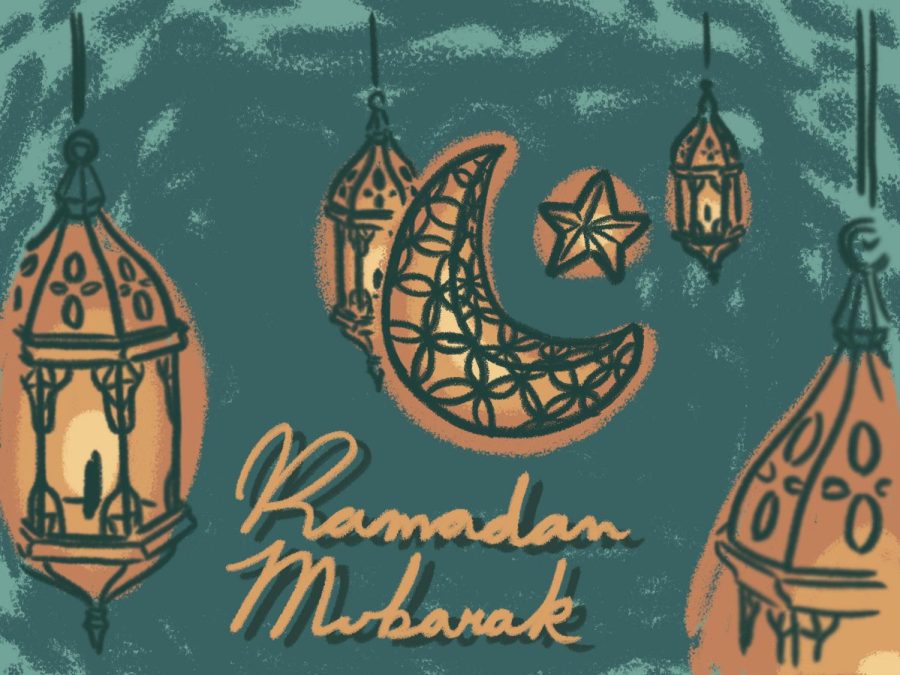Ramadan Mubarak
March 30, 2023
Ramadan is the ninth month of the Muslim calendar and the holiest month in which fasting is observed. It is a month that is eagerly awaited by every Muslim who longs for spiritual renewal. Beginning and ending with the appearance of the crescent moon, it unites 1.8 billion Muslims all over the world for their common strive for introspection, self-restraint and refraining from food and drinks from dawn to dusk. This month, which began on Thursday, March 22, marks this pivotal tradition of fasting since the beginning of Islam in 610 A.D. Muslims believe that during this month, the first revelation of the Koran (the holy book of Muslims) was revealed to the prophet Muhammad through the angel Gabriel. The particular night on which the revelation of the Koran took place is called Laylat-al-Qadr (the night of power).
On this night, the prophet undertook a miraculous journey from Mecca (the holiest city) to Jerusalem, where he then ascended to heaven. It was during this night that the prophet was also mandated to deliver to his believers the five daily prayers, which is one of the five pillars/tenets of Islam. The other four are: believing in the oneness of God (monotheism), giving out annually rated charity (depending on the amount of wealth possessed by one), fasting in the month of Ramadan and performing hajj (pilgrimage to Mecca) once in a lifetime. On this night, a single act of kindness gives the blessings of 1000 months of spiritual dedication. Hence, believers strive to witness this night, which is speculated to fall on the last ten nights of the month, by overlapping their good deeds through an additional prayer (tahajuud), performed in the wee hours of the night.
Muslims also believe that during this month the gates of paradise are opened and the gates of hell are locked and evils are chained. It’s therefore a period of cleansing the soul through prayers, good deeds and asking forgiveness from Allah (God). Traditionally, during the prophet’s time, this month signified the pause of wars against enemies – a hiatus that would necessitate treaties. Therefore, Muslims are also required to emulate these acts of peace-making and general righteousness through forgiveness, acts of kindness, giving out charity, frequent reading of the Koran, prayers and faithful intentions.
Throughout this month, a typical day begins with suhoor (dawn meal) and ends at dusk with iftar (meal at sunset), and you can not eat or drink in between. Both these meals are characterized by heavy food and drinks to compensate for the energy lost during the day, and also to prepare for the next day. It’s customary and Islamically preferred to break the fast with dates and water before devouring other types of food. Muslims usually gather in homes and mosques for iftar in order to facilitate social interactions and extend generosity through communal prayers and feeding the needy. Here at Mac, we try to keep up with this tradition of community bonding and generosity through eating catered-iftar meals together at the chapel (days specified at Mac Communications), and any Mac member is welcome to experience this practice.
One moral reason behind refraining from food and water for the whole day is to feel the suffering of have-nots (specifically those who go to bed with empty and rumbling stomachs), thus the need to cultivate gratitude and humility at the same time.
Muslims have different ways of welcoming and distinctly expressing this month besides eating, fasting and spiritual steadfastness. From where I come from, especially in villages in Northern Eastern Kenya, it’s traditional to beat drums (usually done by a group of boys) at predawn hours in order to wake neighbors who might oversleep and miss the suhoor. It is also common in Muslim-majority countries to shorten the number of working hours so the fasting populations can rest and prepare for iftar. Additionally, it is not a surprise to witness increased charitable activities that supply foodstuffs to community members, and house and street decorations.
Ramadan culminates with the performance of eid al-fitr (festival of breaking) to mark the completion of a major religious responsibility, and the return of ordinary acts of eating and drinking during the daytime. On this day, a congregational morning prayer is performed in open public spaces, followed by visitations, greetings, exchange of gifts and wishing for each others’ prosperity. One of the salutations that you can say to your Muslim friends during that day is Eid Mubarak (blessed holiday). Eid day for this month is expected to be on the 21st/22nd of April, you might surprise your Muslim friend with this salutation.
However, as someone who has gotten used to Eid day as a public holiday for his entire life, I found it quite odd in the last Eid (1st May 2022), having to return to class after the congregation prayer. And of course, as an international, first-year and first-time traveler outside my homeland, I didn’t know that I could ask for accommodations from my instructors. I recently realized this is not a problem solely personal to me, as some of the students in the Muslim community at Mac that I interacted with also expressed their concerns about having classes that coincide with Eid day, and they would therefore like to request their instructors to give them accommodations so that they can share the joy of celebrating with their families and friends in this once-in-a-year great day.














Mohamedamin • Apr 1, 2023 at 1:45 pm
This is the only deed that belongs to Allah Alone and Allah is the One Who rewards it.
…اسوم لي وان اجزي بي
There are actually alot of things to be said about this blessed month,
and I hope I added a very important point to it.
Otherwise great work.
Be blessed.
Heydar Alii • Mar 31, 2023 at 2:44 am
That’s awesome. No any other month like Ramadan, the month of self actualization. Thanks for your contributions, Mr Abdirahman Bile.